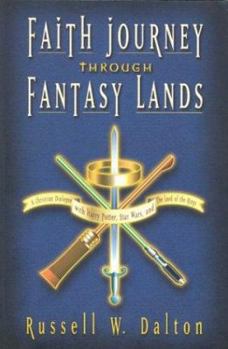Faith Journey Through Fantasy Lands: A Christian Dialogue with Harry Potter, Star Wars, and the Lord of the Rings
Faith Journey through Fantasy Lands engages popular culture in the hugely successful stories of Harry Potter, Star Wars, and The Lord of the Rings. Russell W. Dalton guides the reader through these contemporary fantasy stories, illuminating them with light from the Christian faith journey. The book opens doors to faith-sharing, particularly with young people, while also taking on the issues within the stories that have led some Christians to reject them.
Format:Paperback
Language:English
ISBN:0806645717
ISBN13:9780806645711
Release Date:January 2003
Publisher:Augsburg Fortress Publishing
Length:179 Pages
Weight:0.75 lbs.
Dimensions:0.5" x 6.1" x 9.0"
Customer Reviews
2 ratings
A Review Of Faith Journey Through Fantasy Lands
Published by Thriftbooks.com User , 18 years ago
Few discussions will provoke opinions among believers as heated as whether or not Christians ought to enjoy works of popular fantasy. On the one hand, some claim believers should avoid these realms of the imagination. On the other, there are those Christians so desperate to justify their interest with a veneer of spirituality that they try to establish one to one correlations between these entertaining stories and Holy Scripture. "Faith Journey Through Fantasy Lands: A Christian Dialogue With Harry Potter, Star Wars & Lord Of The Rings" by Russell Dalton endeavors to provide a balance between these competing outlooks. While highlighting the parts of these works that appeal to enduring values, Dalton also admits that neither are these stories themselves Scripture. Rather, he writes, "This book takes an approach that goes beyond a `thumbs up' or `thumbs down' evaluation of fiction and film. It gives the reader a chance to reflect whether or not the behaviors and beliefs of the characters in today's fantasy stories are consistent with the Christian faith, but it also looks at the questions these stories demand of our faith by entering into a dialogue between these fantasy stories and the Christians story (7)." Rather than condemn The Lord Of The Rings, Star Wars, or even Harry Potter, "Faith Journey Through Fantasy Lands" prudently counsels that the problems that arise in reference to these stories often lie not so much in the stories themselves but in those that read them. For example, most that read Harry Potter are not going to end up sacrificing goats or taking oaths of unending allegiance to Satan. Thus, Dalton suggests, parents must decide for themselves how much exposure to Star Wars, Harry Potter, and The Lord Of The Rings their children should receive. Though for the most part balanced in his approach, the reader will no doubt detect a hint of political correctness seeping into Dalton's exposition. For example, he does not use the phrase "Kingdom of God" but rather "The Reign Of God." Likewise, Dalton does not refer to Jesus as "the Son of Man" but rather as "the Son of Humanity". Dalton also gets all maudlin that the characters in these stories are primarily White. But since Middle Earth is said to correspond to some kind of pre-historic Europe and Hogwarts is a British alchemical school, what does he expect? If Aragorn had had such vacillating attitudes, Sauron would have still been ruling over Middle Earth by the end of the third film. Even if one disagrees with the conclusions drawn by "Faith Journey Through Fantasy Lands", one has to admit Dalton approaches the issue in an overall even handed manner carefully respecting the opinions on each side. by Frederick Meekins
Excellent!
Published by Thriftbooks.com User , 21 years ago
This is an excellent analysis of a most important modern "miracle" - the religious reasons behond the huge success of these epic tales of high romance in a culture that too often seems fixated on the squalid. I would recommend to go with it Hal GP Colebatch's "Return of the heroes: The Lord of the Rings, Star Wars, Harry Potter and Social Conflict." This is a literay, political, historical and religious study, full of information and insight. The two books go together to make essential reading for the culturally literate in the 21st Century.






